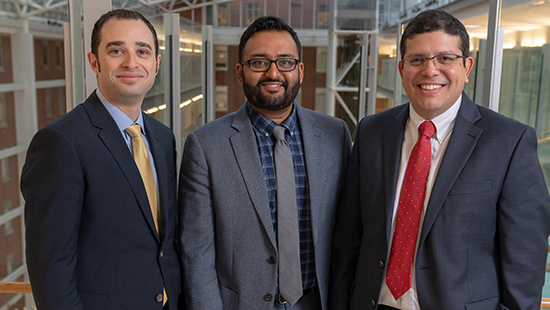Limb Preservation

Jacob Wynes, DPM, podiatric surgery, Khanjan Nagarsheth, MD, vascular surgery and Rafael Cires-Drouet, MD, vascular medicine, (left to right) work as a team, bringing their specialized expertise to each patient.
Patients with diabetes, peripheral artery disease and non-healing leg wounds are at a higher risk for leg amputation.
At the University of Maryland's Limb Preservation Program, our experts from several different specialties work together in order to prevent amputation by aggressively addressing the factors that can lead to limb loss.
Amputation Prevention
We use a team approach to prevent major leg amputations and to help preserve the quality of life of our patients. Specialists from vascular surgery to podiatry to infectious diseases provide comprehensive care that includes proper wound management and minimally invasive and open surgical procedures that improve blood flow to the foot.
Nearly all leg amputations begin with a non-healing ulcer or chronic wound in the foot. Additionally, more than 60 percent of all lower-limb amputations are performed in people with diabetes, according to the American Diabetes Association. Make an appointment with the University of Maryland so that we can assess your ailment.
UMMC Limb Preservation Program
In one visit to the Limb Preservation Clinic, patients meet with UMMC specialists in podiatry, vascular surgery and infectious disease.
Our focus is on painless, non-invasive diagnostic methods, such as ultrasound and x-rays, to determine the location and scope of impaired blood flow to the leg, as well as any bony infection or abnormality. This process enables physicians to devise individualized treatment plans that may involve medical or surgical approaches, including medications; circulatory assist devices; specialized wound care products; and both minimally-invasive and open surgical procedures.
Hyperbaric treatment, believed to facilitate the growth of new blood vessels, is also available. Consultations with specialists in plastic surgery, vascular medicine and cardiology are available when needed.
When to Contact the Limb Preservation Program at UMMC
- You have severe peripheral arterial disease with foot or leg pain while resting, non-healing ulcers or gangrene.
- You have wounds that limit the functional use of the leg.
- You have diabetes, especially patients with neuropathy, that has led to sensory loss or pressure sores.
- You have lower-limb cramping after walking very short distances.
Schedule an Appointment
Our program has two convenient locations. Call to schedule an appointment or for more information.
